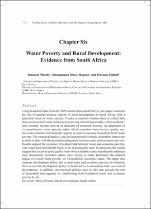JavaScript is disabled for your browser. Some features of this site may not work without it.
- ResearchSpace
- →
- Research Publications/Outputs
- →
- Journal Articles
- →
- View Item
| dc.contributor.author |
Matshe, I

|
|
| dc.contributor.author |
Maposa, Sibonginkosi

|
|
| dc.contributor.author |
Zikhali, P

|
|
| dc.date.accessioned | 2015-11-06T09:21:10Z | |
| dc.date.available | 2015-11-06T09:21:10Z | |
| dc.date.issued | 2013-08 | |
| dc.identifier.citation | Matshe I, Moya-Maposa, S and Zikhali, P. 2013. Water poverty and rural development: Evidence from South Africa. African Journal of Agricultural and Resource Economics, vol. 8(2), pp 136-156. | en_US |
| dc.identifier.issn | 1993-3738 | |
| dc.identifier.uri | http://hdl.handle.net/10204/8243 | |
| dc.description | Copyright: African Association of Agricultural Economists | en_US |
| dc.description.abstract | Using household data from the 2009 General Household Survey, this paper examines the role of natural resource scarcity in rural development in South Africa, with a particular focus on water scarcity. It seeks to examine whether there is a direct link between household water and economic poverty of rural households, with households’ total monthly income used as an indicator of economic poverty. An adaptation of a comprehensive water poverty index, which considers water access, quality, use, and water-related environmental aspects is used to measure household-level water poverty. The empirical analysis uses an instrumental variable estimation framework in order to deal with the potential endogeneity between water and economic poverty. Results support the existence of a direct link between water and economic poverty, with water-poor households likely to be economically poor. In particular, the results suggest that access to good quality water from a reliable source significantly enhances rural households’ economic status. Also, access to water determines the realized impact of overall water poverty on a household’s economic status. The paper thus cautions development policy not to treat water and economic poverty in isolation; there is need for development policy in South Africa to streamline water use in rural development. In addition, development policies need to take into account the role of household heterogeneity in conditioning both household water and economic poverty levels. | en_US |
| dc.language.iso | en | en_US |
| dc.publisher | African Association of Agricultural Economists | en_US |
| dc.relation.ispartofseries | Worklist;12419 | |
| dc.subject | Price volatility | en_US |
| dc.subject | South African rural development | en_US |
| dc.subject | South African water poverty | en_US |
| dc.title | Water poverty and rural development: Evidence from South Africa | en_US |
| dc.type | Article | en_US |
| dc.identifier.apacitation | Matshe, I., Maposa, S., & Zikhali, P. (2013). Water poverty and rural development: Evidence from South Africa. http://hdl.handle.net/10204/8243 | en_ZA |
| dc.identifier.chicagocitation | Matshe, I, Sibonginkosi Maposa, and P Zikhali "Water poverty and rural development: Evidence from South Africa." (2013) http://hdl.handle.net/10204/8243 | en_ZA |
| dc.identifier.vancouvercitation | Matshe I, Maposa S, Zikhali P. Water poverty and rural development: Evidence from South Africa. 2013; http://hdl.handle.net/10204/8243. | en_ZA |
| dc.identifier.ris | TY - Article AU - Matshe, I AU - Maposa, Sibonginkosi AU - Zikhali, P AB - Using household data from the 2009 General Household Survey, this paper examines the role of natural resource scarcity in rural development in South Africa, with a particular focus on water scarcity. It seeks to examine whether there is a direct link between household water and economic poverty of rural households, with households’ total monthly income used as an indicator of economic poverty. An adaptation of a comprehensive water poverty index, which considers water access, quality, use, and water-related environmental aspects is used to measure household-level water poverty. The empirical analysis uses an instrumental variable estimation framework in order to deal with the potential endogeneity between water and economic poverty. Results support the existence of a direct link between water and economic poverty, with water-poor households likely to be economically poor. In particular, the results suggest that access to good quality water from a reliable source significantly enhances rural households’ economic status. Also, access to water determines the realized impact of overall water poverty on a household’s economic status. The paper thus cautions development policy not to treat water and economic poverty in isolation; there is need for development policy in South Africa to streamline water use in rural development. In addition, development policies need to take into account the role of household heterogeneity in conditioning both household water and economic poverty levels. DA - 2013-08 DB - ResearchSpace DP - CSIR KW - Price volatility KW - South African rural development KW - South African water poverty LK - https://researchspace.csir.co.za PY - 2013 SM - 1993-3738 T1 - Water poverty and rural development: Evidence from South Africa TI - Water poverty and rural development: Evidence from South Africa UR - http://hdl.handle.net/10204/8243 ER - | en_ZA |






